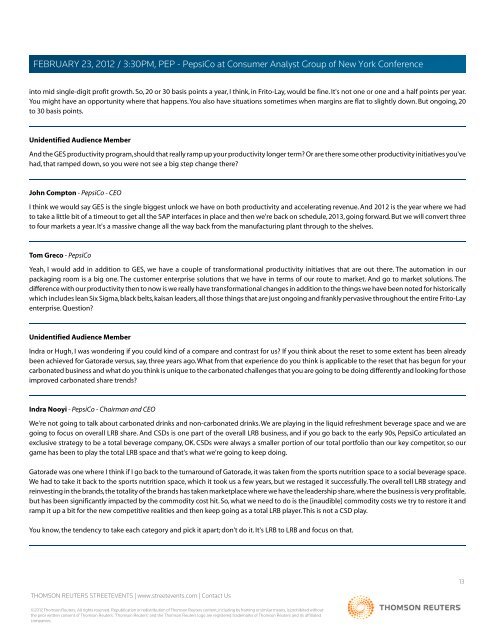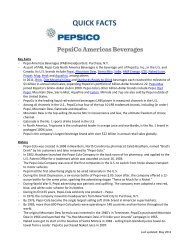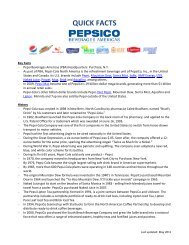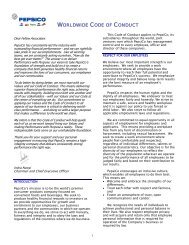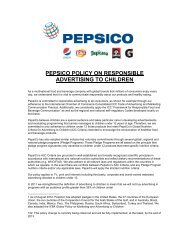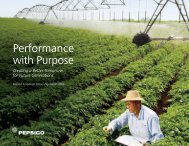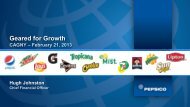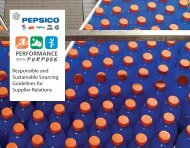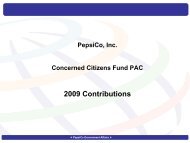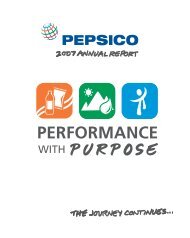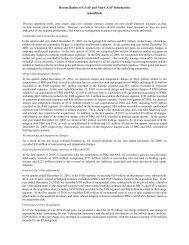FEBRUARY 23, 2012 / 3:30PM, PEP - <strong>PepsiCo</strong> at Consumer Analyst Group of New York Conferenceinto mid single-digit profit growth. So, 20 or 30 basis points a year, I think, in Frito-Lay, would be fine. It's not one or one and a half points per year.You might have an opportunity where that happens. You also have situations sometimes when margins are flat to slightly down. But ongoing, 20to 30 basis points.Unidentified Audience MemberAnd the GES productivity program, should that really ramp up your productivity longer term? Or are there some other productivity initiatives you'vehad, that ramped down, so you were not see a big step change there?John Compton - <strong>PepsiCo</strong> - CEOI think we would say GES is the single biggest unlock we have on both productivity and accelerating revenue. And 2012 is the year where we hadto take a little bit of a timeout to get all the SAP interfaces in place and then we're back on schedule, 2013, going forward. But we will convert threeto four markets a year. It's a massive change all the way back from the manufacturing plant through to the shelves.Tom Greco - <strong>PepsiCo</strong>Yeah, I would add in addition to GES, we have a couple of transformational productivity initiatives that are out there. The automation in ourpackaging room is a big one. The customer enterprise solutions that we have in terms of our route to market. And go to market solutions. Thedifference with our productivity then to now is we really have transformational changes in addition to the things we have been noted for historicallywhich includes lean Six Sigma, black belts, kaisan leaders, all those things that are just ongoing and frankly pervasive throughout the entire Frito-Layenterprise. Question?Unidentified Audience MemberIndra or Hugh, I was wondering if you could kind of a compare and contrast for us? If you think about the reset to some extent has been alreadybeen achieved for Gatorade versus, say, three years ago.What from that experience do you think is applicable to the reset that has begun for yourcarbonated business and what do you think is unique to the carbonated challenges that you are going to be doing differently and looking for thoseimproved carbonated share trends?Indra Nooyi - <strong>PepsiCo</strong> - Chairman and CEOWe're not going to talk about carbonated drinks and non-carbonated drinks. We are playing in the liquid refreshment beverage space and we aregoing to focus on overall LRB share. And CSDs is one part of the overall LRB business, and if you go back to the early 90s, <strong>PepsiCo</strong> articulated anexclusive strategy to be a total beverage company, OK. CSDs were always a smaller portion of our total portfolio than our key competitor, so ourgame has been to play the total LRB space and that's what we're going to keep doing.Gatorade was one where I think if I go back to the turnaround of Gatorade, it was taken from the sports nutrition space to a social beverage space.We had to take it back to the sports nutrition space, which it took us a few years, but we restaged it successfully. The overall tell LRB strategy andreinvesting in the brands, the totality of the brands has taken marketplace where we have the leadership share, where the business is very profitable,but has been significantly impacted by the commodity cost hit. So, what we need to do is the [inaudible] commodity costs we try to restore it andramp it up a bit for the new competitive realities and then keep going as a total LRB player.This is not a CSD play.You know, the tendency to take each category and pick it apart; don't do it. It's LRB to LRB and focus on that.THOMSON REUTERS STREETEVENTS | www.streetevents.com | Contact Us13©2012 Thomson Reuters. All rights reserved. Republication or redistribution of Thomson Reuters content, including by framing or similar means, is prohibited withoutthe prior written consent of Thomson Reuters. 'Thomson Reuters' and the Thomson Reuters logo are registered trademarks of Thomson Reuters and its affiliatedcompanies.
FEBRUARY 23, 2012 / 3:30PM, PEP - <strong>PepsiCo</strong> at Consumer Analyst Group of New York ConferenceJohn Compton - <strong>PepsiCo</strong> - CEOI will let you ask a question. [inaudible] so I hope it's a snack question.Unidentified Audience MemberIt is. I guess I'm having trouble reconciling all the great stuff that you put up here and say, "Look, it's a great business" and we never really questionthat, at least rarely do we. I'm having trouble reconciling that image with what we heard from the 2012 perspective, which is, "Look, we're goingto be impacted by negative 9% of commodities this year that we can't do much about," and disproportionately at commodities and thatdisproportionality hits Frito. And so although you were saying we're pricing all the commodities through, just trying to understand you are seeinga little bit of a shift in your ability to take pricing through, and whether that's going to impact, again, to the margin question against the pricingversus volume question.John Compton - <strong>PepsiCo</strong> - CEOI will take snacks. We have been clear about Frito-Lay. We fully intend to price through commodity costs and other inflationary costs. We're usingour accelerated productivity that Tom outlined to help on the A&M step up. Other markets around the world are a little different because themarkets are challenged, et cetera, and even in snacks in some of those markets we are not able to fully price the commodities through.If your question is around Frito-Lay, we are pricing it through.Indra Nooyi - <strong>PepsiCo</strong> - Chairman and CEOJust picking up where John left off, we looked across the world to see not a brand power, but from an economy perspective, and where we aretrying to build frequency and penetration of our beverage and snack brands. Countries which are distressed, countries where we believe we cannotpass all the pricing through because the coinage causes huge jumps in pricing, we had to pull back and absolving a lot of the cost inflation.You know, to take an example of the Middle East. The coinage went from [one real to 1.50.] There's no in between, so when you have to increasethe price by 50%, you go for a while before you take that price increase. Last year, we took the price increase, there was a drop-off in volume, thenit recovered as the consumer got used to it. So, I think we went through it country by country and in North America Frito-Lay many parts of LatinAmerica and a large portion of North America beverages, we were able to pass the pricing I mean, the inflation through.The issue is the volume hit. I mean, we have been watching all of the CAGNY presentations this week; there's been a volume hit when people tookpricing. The question is in our kind categories, we want to keep people in the category. So, we've had to balance very, very carefully how muchpricing you can take, how you can keep building the frequency and penetration of our products. And that's the overall [quilt] that we try to workwith this year, as the commodity cost is so extraordinary.Tom Greco - <strong>PepsiCo</strong>If I can add to that as well. I have seen people write-- I did talk about the fact that that ag was more inflationary than energy, but at the same timepeople tend to forget that sweetener is basically ag, and the lag factor that I talked about on the systematic forward buying program affects thatjust as much as it does affect the food business. I think there may be a bit of a misconception out there that commodity inflation is predominantlyin the food business. It's pretty well spread across both businesses and it will improve across both businesses during the course of the year. It willbe higher than the 7% early in the year and the latter portion of the year it should be lower than that, based on what we log in.THOMSON REUTERS STREETEVENTS | www.streetevents.com | Contact Us14©2012 Thomson Reuters. All rights reserved. Republication or redistribution of Thomson Reuters content, including by framing or similar means, is prohibited withoutthe prior written consent of Thomson Reuters. 'Thomson Reuters' and the Thomson Reuters logo are registered trademarks of Thomson Reuters and its affiliatedcompanies.
- Page 4 and 5: FEBRUARY 23, 2012 / 3:30PM, PEP - P
- Page 6 and 7: FEBRUARY 23, 2012 / 3:30PM, PEP - P
- Page 8 and 9: FEBRUARY 23, 2012 / 3:30PM, PEP - P
- Page 10 and 11: FEBRUARY 23, 2012 / 3:30PM, PEP - P
- Page 12 and 13: FEBRUARY 23, 2012 / 3:30PM, PEP - P
- Page 16: FEBRUARY 23, 2012 / 3:30PM, PEP - P


